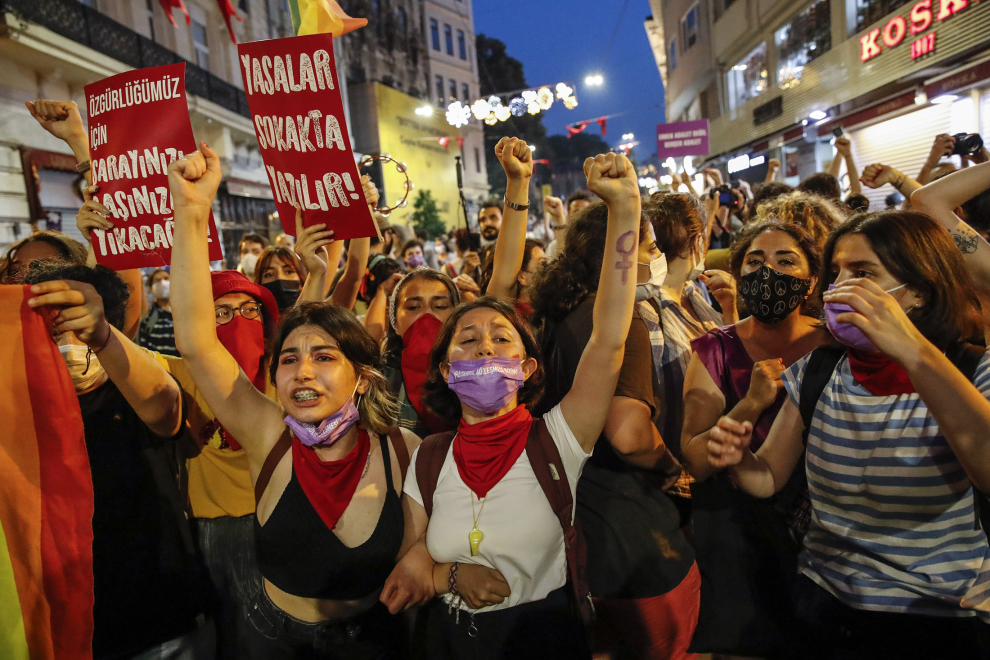Femicide, domestic violence, online stalking: the goal of the Istanbul Convention is to prevent and eliminate violence against women. The majority of EU members and other European nations have already ratified it, while others have yet to agree to it, writes the European newsroom, which Hina is a part of.
A week before International Women’s Day, the European Parliament once again called on the entire EU to ratify the Council of Europe Convention on preventing and combating violence against women and domestic violence as soon as possible.
Every third woman in the EU has already experienced physical or sexual violence, so rapid ratification is needed, warned several MEPs.
Several countries that have already ratified the document have also redefined domestic laws to protect women. Others still lack a national plan for the implementation of the Convention.
The Council of Europe created the Istanbul Convention in 2011. Of the 10 countries that first ratified the Convention, eight of them were members of the Council of Europe. By signing, the countries undertook to prevent, prosecute and eliminate violence against women.
It entered into force on August 1, 2014, and was signed by the EU on June 13, 2017.
Almost six years after the signing of the Convention, the EU still has not ratified it as six member states – Bulgaria, the Czech Republic, Hungary, Latvia, Lithuania and Slovakia – refuse to do so in the Council of the EU.
But the European Court of Justice (ECJ) ruled in 2021 that the Union can proceed with ratification even without unanimity.
Poland, which ratified the Convention in 2015, is now trying to revoke it, saying it is “harmful” because it requires schools to teach children about gender.
Turkey withdrew from the Convention in 2021.
Despite the war, Ukraine managed to ratify the Istanbul Convention last year, the first international treaty to set legally binding standards to prevent violence against women.
“Yes means yes”: progressive laws in Spain and Slovenia
Slovenia and Spain ratified the Istanbul Convention in 2015 and 2014, respectively, and redefined the crimes of rape and sexual violence in order to accept the concept of “yes means yes”.
That is, if a person does not clearly express his will to be sexually active, it must be considered as “no”. Therefore, in the new law, the use of force is not a necessary condition for punishing aggressiveness.
According to a 2020 report by the European Women’s Lobby, Spain has made progress in preventing and prosecuting crimes against women since ratification. The state increased financial support for affected women and provided safe havens.
In accordance with the guidelines of the Istanbul Convention, Spain became the first country in the European Union to officially record all types of femicide in 2022. Despite this, eradicating violence against women is still a challenge in that country. Last year, 45 women were killed in gender-based violence.
Slovenia had no major problems with compliance with the Convention. When the Polish government began to examine the possibility of withdrawing from the Convention in mid-2020, the Slovenian government did not see the need for it at the time. According to the 2021 report of the Grevio group of experts of the Council of Europe, responsible for monitoring the implementation of the Convention, Slovenia has made progress in establishing a legal, institutional and political framework.
But Slovenia should pay more attention to women from vulnerable groups and improve data collection, and the criminal justice system should act more strongly against all forms of violence against women. Domestic violence against women has increased significantly during the covid-19 pandemic. In 2020, there were 10 cases of femicide. According to the latest data, every fifth woman in Slovenia has experienced some form of violence.
Germany does not have a national action plan
The Istanbul Convention entered into force in Germany on February 1, 2018. However, the country lacks thousands of shelters for women to implement the Convention according to the guidelines.
The latest Grevio report on Germany from October 2022 states that there has been no national action plan until now. Shelters and counseling centers for women are very unevenly distributed and lacking in rural areas.
However, experts welcomed certain developments in German criminal law. This included, for example, the explicit criminalization of abuse through technology such as online stalking or unauthorized photography of private parts of the body.
In Italy, resistance to gender issues
In 2013, Italy was the fifth country to ratify the Istanbul Convention.
According to a 2020 Grevia report, Italian laws are in many cases “innovative” but too often not implemented effectively and equally across the country. In addition, the report raised various concerns about gender equality, by collecting data in court and custody cases after women became victims of domestic violence.
The report states that the country must “ensure adequate financial and human resources” to implement existing laws and policies. Policies should be coordinated and monitored “between national, regional and local authorities”. In addition, experts call for the establishment of basic and specialized services for women victims of violence, which should be available throughout the country.
Grevio highlights the “resistance to gender equality” in Italy. This could be seen in schools and universities through the delegitimization of gender studies. Some cities have “censored” public library events aimed at raising awareness of gender issues.
Croatia: Controversial ratification process
As in other countries of Central and Eastern Europe, the Istanbul Convention caused divisions in Croatian society.
Croatia signed the agreement on January 22, 2013, and the Croatian Parliament ratified it on April 13, 2018. But the ratification shook the center-right ruling party – the Croatian Democratic Union (HDZ).
Prime Minister Andrej Plenković tried to appease critics, inside and outside the party, by inserting into the law a statement that the Convention is in accordance with the Constitution of the Republic of Croatia and that it does not contain so-called gender ideology.
Opponents, mostly circles close to the Catholic Church, pointed out that the Istanbul Convention is being misused in order to introduce “gender ideology” into Croatian legislation, education and media, that is, the separation of gender from biological sex. Others pointed out that science distinguishes between sex and gender.
Activists for women’s rights believe that the Istanbul Convention is not adequately implemented in Croatia. At a round table in the Croatian Parliament last November, they said that the system is inadequate because judges do not know what gender-based violence is. They were particularly critical of court procedures that impose symbolic sentences for domestic violence.
Another problem is that women have a hard time deciding to report an abusive partner because they fear that they will not be believed. If they do decide to report it, they often do so years after the divorce, and then they are often faced with doubts as to whether the violence happened at all. Psychological violence against women is also often not acknowledged.
The delegation of GREVIO was on an evaluation visit to Croatia from October 17 to 21, 2022, and the publication of the report on Croatia is planned during this year.
Bulgaria amends the laws, but refuses to ratify the Convention
In 2018, the Bulgarian Constitutional Court issued a decision stating that the Istanbul Convention advances legal concepts related to the concept of gender, which are not compatible with the fundamental principles of the Bulgarian constitution.
In accordance with that decision, Bulgaria did not support two draft Council decisions to ratify the Istanbul Convention at the EU level.
The Bulgarian government and civil society have been actively working to prevent forms of violence against women and provide protection and support to victims, claims official Sofia.
The Bulgarian Ministry of the Interior announced in December that a total of 3,085 protection orders were issued under the Law on Protection from Domestic Violence between January 1 and October 31, 2022. In those 10 months, 2,656 women, 349 men and 873 children were victims of violence in family committed by 2,713 men and 283 women.
In November, the Bulgarian Ministry of Justice presented a draft law with amendments to the Law on Protection from Domestic Violence, which envisages the launch of a national information system and a national register of cases of domestic violence.
Bosnia and Herzegovina: Every fourth woman is a victim of domestic violence
Bosnia and Herzegovina was among the first countries in Europe to ratify the Istanbul Convention, already in 2013. However, the Convention has not been fully incorporated into the country’s legal framework, although some parts are included in entity laws.
The BiH Agency for Gender Equality is responsible for implementing the Convention and ensuring a unique system of prevention and protection of victims of violence, without discrimination based on the entity, canton or municipality where the victims live. BiH is suffering the consequences of the constitutional division of jurisdiction in the country. This results in different practices, which causes inequality in the realization of the right to protection.
According to the report of the BiH Agency for Gender Equality, every fourth woman is a victim of domestic violence. More and more often, violent behavior ends in femicide, and it is not legally recognized as such.
Every other woman over the age of 15 has experienced some form of physical, psychological or sexual violence.
Source: fenix-magazin







































